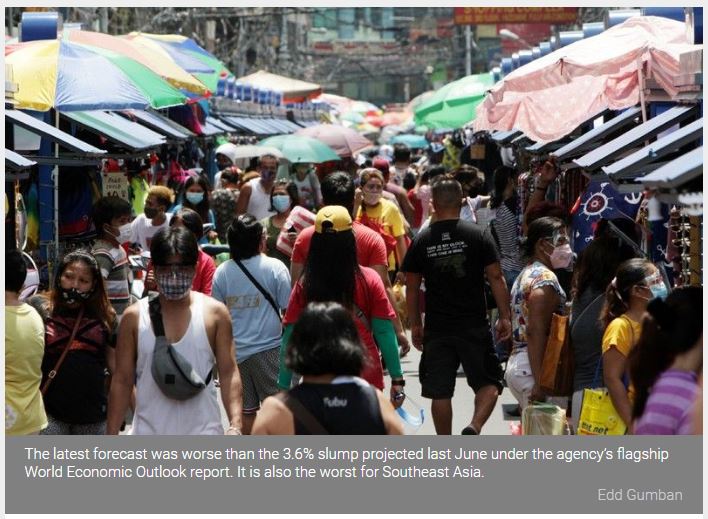IMF sees sharper fall for Philippine economy this year
MANILA, Philippines — The “Great Lockdown” from March may have already eased, but is not loosened enough to put the brakes on the Philippine economy’s fall this year.
Even with most of the economy already reopened, the existence of some form of movement restrictions to fight the deadly coronavirus would force the economy to contract faster than initially expected this year at 8.3% annually, the International Monetary Fund (IMF) said on Tuesday.
The latest forecast was worse than the 3.6% slump projected last June under the agency’s flagship World Economic Outlook report. It is also the worst for Southeast Asia.
“During May and June, as many economies tentatively reopened from the Great Lockdown, the global economy started to climb from the depths to which it had plunged in April,” the IMF said in its new report.
“But with the pandemic spreading and accelerating in places, many countries slowed reopening, and some are reinstating partial lockdowns,” it added. “The global economy’s long ascent back to pre-pandemic levels of activity remains prone to setbacks.”
With the scale of economic damage, the government would likely accumulate debts in the next 5 years at a level not seen during normal times. Spending to temper the coronavirus impact would swell, bringing the budget deficit to a record 8.1% of economic output this year from just 3.2% last year.
The budget gap, nonetheless, is expected to persistently narrow from 7.3% next year to a little over 6% from 2022 to 2025 when a new government would have had taken over. State investments, while costly, are seen to benefit the economy of a faster rebound at 7.4% next year, better than June’s 6.8% and within government expectations. By 2025, the economy is seen growing 6.5% year-on-year.
“These high levels of public debt are hence not the most immediate risk. The near-term priority is to avoid premature withdrawal of fiscal support,” IMF said in a separate report.
“Support should persist, at least into 2021, to sustain the recovery and to limit long-term scarring,” it added.
Compared with other multilateral institutions that also slashed their GDP outlook, IMF’s 2020 forecast for the Philippines is more pessimistic than the World Bank’s -6.9% forecast and the Asian Development Bank’s -7.3%.
Emerging economies to lag behind
Beyond local borders, pessimistic forecasts for the Philippines reflected a broader weaker projection for emerging markets now seen contracting 3.3% on-year in 2020 from 3.1% previously. Advanced economies, especially in Europe, are likely to drive global growth this year, thanks to their early containment of the coronavirus.
One marked difference that spelled this polarizing fate, IMF said, was the quality of healthcare systems to deal with the pandemic— one which has easily gone “overwhelmed” in developing nations that in turn, jeopardized their pandemic response.
Apart from poor public health, emerging countries like the Philippines are likewise found heavily dependent on overseas remittances which are expected to dry up this year due to job-killing lockdowns. The result is slower growth that would exacerbate income inequality across territories.
“Moreover, younger workers, those in less secure work arrangements and those employed in small and medium enterprises appear more vulnerable to layoffs,” the Washington-based lender said.
In general, low-wage earners are at an appreciably higher risk of losing jobs than those in upper quintiles of the wage distribution,” it added.
Under emerging markets, IMF sees the five major developing economies in Southeast Asia— Asean-5— contracting faster at 3.4% from 2% originally. Beyond the region, trade performance is lackluster this year, suffering a 10% drop before an 8% rebound in 2021, while inflation would remain under control.
“Progress with vaccines and treatments, as well as changes in the workplace and by consumers to reduce transmission, may allow activity to return more rapidly to pre-pandemic levels than currently projected, without triggering repeated waves of infection,” IMF said.
Source: https://www.philstar.com/business/2020/10/13/2049294/imf-sees-sharper-fall-philippine-economy-year


 Thailand
Thailand




